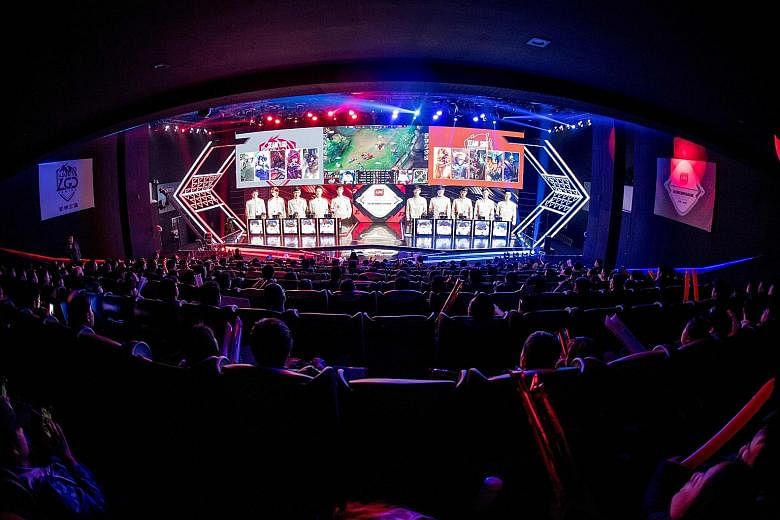HANGZHOU • Tucked away in a nondescript furniture mall, LGD Gaming's multimillion-dollar eSports home venue may not bring to mind Old Trafford or Yankee Stadium, but it could represent the future of sport.
The 400-seat arena in the eastern Chinese city of Hangzhou packs in pumped-up fans several times a month for LGD's matches in the League Of Legends Pro League (LPL), a 14-club professional eSports competition that this year began playing in purpose-built venues.
eSports is booming in China, driven by popular games such as League Of Legends and Dota2, raising hopes of eventual Olympic inclusion and turning young players into rich celebrities.
Specially designed eSports arenas are appearing in the United States and China to accommodate growing crowds attending multi-team tournaments.
But the LPL's "home stadiums" put China ahead of the curve, industry insiders said.
"Home venues let the clubs localise their fan base," said Mr Yang Shunhua, LGD's general manager. "It gives fans more opportunity to meet the athletes and clubs. It's the future of eSports."
Beginning play in 2013, LPL matches were staged in Shanghai. But Chinese Internet giant Tencent, the league's owner, is encouraging teams to lay down local roots.
Three clubs now have home arenas - the other two are in the south-western cities of Chongqing and Chengdu - and more are planned, Mr Yang said.
Whether the strategy proves successful remains to be seen, but there is no shortage of ambition at LGD's flashy facility, which Mr Yang said cost 30 million yuan (S$6.3 million).
Occupying 2,200 sq m, it features press conference venues, fan zones, practice spaces, a bar, a gift shop and high-tech control rooms where squads of young technicians coordinate Web broadcasts to millions of spectators.
On stage, LGD's five-man squad sit like astronauts at futuristic consoles, controlling avatars who battle a team from the city of Nanjing on a 7m-wide screen above them. Announcers breathlessly call the action, play by play.
In the stands, around 400 fans, sitting in chairs with massage functions, bang thundersticks and roar whenever the on-screen action - a frantic brawl in a fantasy world - heats up.
Chinese eSports is increasingly resembling big-time sports in other ways as well. LGD's full squad is mostly Chinese but includes two Korean imports and Mr Yang says transfer fees for top LPL players have reached several million dollars.
The global professional eSports industry will grow 38 per cent this year to US$906 million (S$1.2 billion) in revenue, industry analyst Newzoo has forecast, with China representing 18 per cent of that, third behind the US and Europe.
Around 380 million fans worldwide will watch professional eSports events this year, Newzoo said.
Top Chinese LPL players earn as much as US$1.5 million a year, Mr Yang said. "It gives our youth more choices. It's not like before when all you could do was study. Now there are other roads," he added.
AGENCE FRANCE-PRESSE

